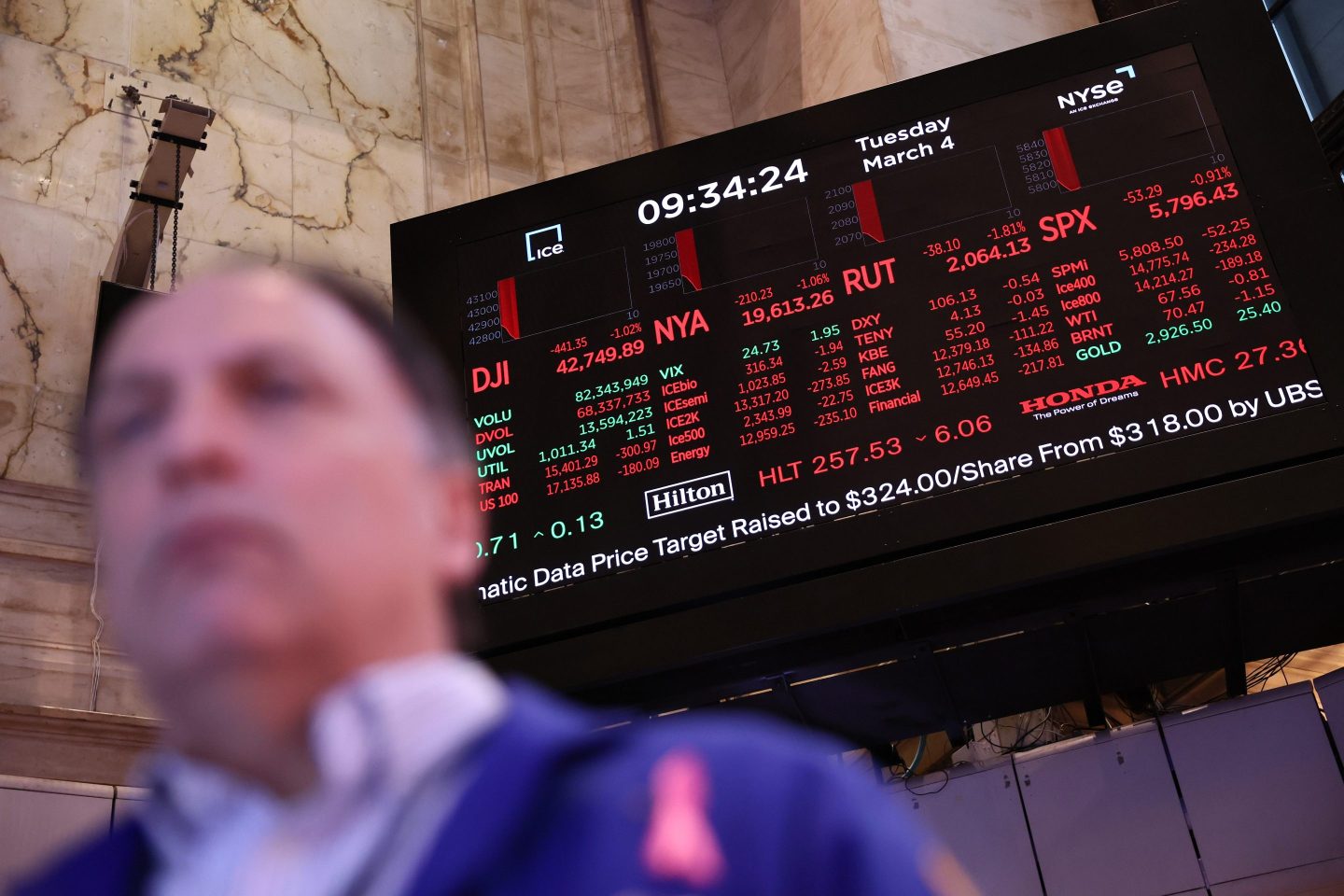- Many investors thought President Donald Trump would prioritize tax cuts and deregulation over imposing tariffs. That trade has unwound, with market participants pulling out of hot tech names that have led an AI-driven bull market and heading toward more defensive assets.
Markets sold off amid a President Trump–size correction on Monday as investors worried whether tariff uncertainty could steer the economy into recession. The S&P 500’s postelection rally has been more than erased, with the index declining 2.7% to start the week and closing just above the $5,600 mark for the first time since mid-September. Big Tech names that have led the stock market’s AI boom over the past two years were hit hard, and the Nasdaq Composite fell 4% to see its worst day since September 2022.
Trump used the stock market as a scorecard during his first term, regularly boasting about soaring share prices as evidence that investors approved of his performance. Now, the president and his economic officials acknowledge short-term economic pain might be necessary to reshape America’s economy. In an interview with Fox News on Sunday, Trump declined to rule out a recession, saying the economy is in a “period of transition, because what we’re doing is very big.”
Sam Stovall, chief investment strategist at CFRA Research, called Monday’s pullback a “manufactured correction,” a reference to how markets have reacted to deliberate policy out of the White House. Wall Street initially looked at Trump’s tariff threats as mostly bluster, but investors are now concerned trade policy uncertainty will impact expectations for corporate profits.
“Bull markets don’t die of old age,” he said. “They die of fright, and what they’re most afraid of is recession.”
The stock market’s postelection rally came in part because many traders believed pro-growth aspects of Trump’s agenda, like tax cuts and deregulation, would be prioritized over economically riskier policies like tariffs. Because of the president’s previous fixation on stock prices, many investors believed Trump would intervene with policy if markets plunged. However, Treasury Secretary Scott Bessent recently refuted this notion of a “Trump put,” a play on options parlance.
Jay Hatfield, CEO of Infrastructure Capital Advisors, said he wasn’t surprised. He also thinks markets are currently prone to overreact, with no big earnings reports from companies counteracting the deluge of headlines coming from Washington.
“We do think the economy is falling and the Fed needs to cut,” said Hatfield, who manages ETFs and several hedge funds, “but we don’t think we’re going into recession. The market’s starting to think we are.”
The Atlanta Fed’s GDPNow estimate, while volatile week-to-week, currently signals a contraction of negative 2.4% growth for this quarter, punctuating several weeks of disappointing economic data. The S&P is nearly 9% off its all-time high in mid-February, while the Nasdaq Composite has fallen 13% in that span.
Monday’s rout was led by some of the market’s hottest tech stocks, with Tesla shares plummeting 15% to post their worst day since 2020. Nvidia, the chip behemoth at the heart of the AI trade, saw its stock drop 5%.
“What’s encouraging, though, is that recently, we’ve seen investors rotate into the defensive groups of consumer staples, health care, utilities, so a lot of times [these sectors have] been in the green,” Stovall said, “implying that investors are willing to rotate, not necessarily totally retreat.”
Investors also piled into “risk-free” Treasuries, pushing yields lower. Hatfield doesn’t necessarily see a lot of positive catalysts for stocks in the near-term, but he thinks the $5,400 or $5,500 threshold for the S&P likely signals the bottom of the selloff. Like much of Wall Street, he still has a $6,600 price target on the index.
“But we’re below the 200-day moving average,” he said, “which is risky.”












